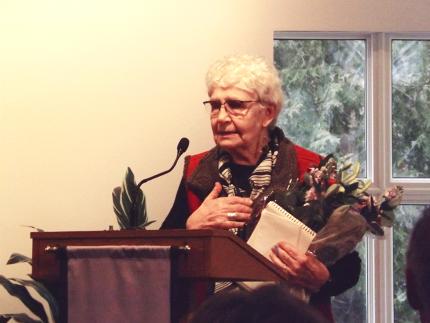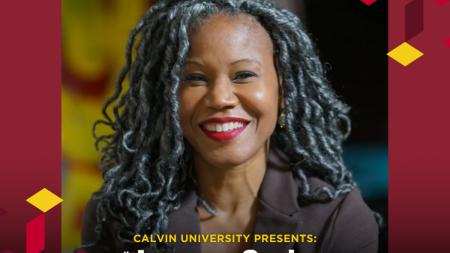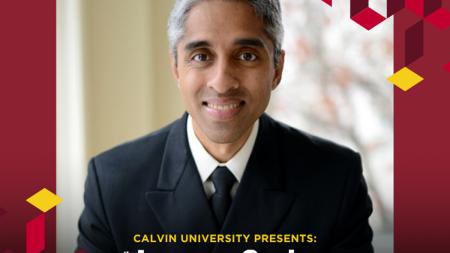Protecting the Flock

As they have done for over 20 years, people gathered on the first Saturday in March from across Ontario and beyond for the Annual Inter-Classis Safe Church Conference at Waterloo (Ont.) Christian Reformed Church.
Hosted by the Classis Huron Safe Church Committee, the event brought almost 70 people together for a day of learning and connecting around topics of abuse prevention and response.
Rev. Carel Geleynse opened with devotions, reflecting on 1 Peter 2:4-12, where Peter reminds followers of Christ that they are like living stones in God’s house, a holy priesthood, a chosen people called out of darkness into God’s light.
The reputation and credibility of church leaders and Christians has taken a hit, explained Geleynse, because of bad behavior among many church leaders – abuse, misinterpreting the Bible to preach a “prosperity gospel,” caving to a desire for power, and more. In times like these, said Geleynse, Peter’s call to Christians still applies: “Live such good lives among the pagans that, though they accuse you of doing wrong, they may see your good deeds and glorify God on the day he visits us” (1 Peter 2:12).
Peter Schuurman, adjunct professor at Redeemer University and executive director of Global Scholars Canada, led the first session, discussing clergy sexual abuse and its aftermath, especially in megachurches and prominent ministries. He mentioned a number of ministry leaders whose sexual sins were brought to light in recent years – a close friend and colleague in campus ministry, an apologist respected around the globe, a megachurch leader shepherding 5,000 people at the height of his church’s popularity, a Christian university president. “Abuse comes in different packages,” said Schuurman. “It’s no respecter of persons.”
Matthew 9:36 describes Jesus’ compassion for the crowds of people following him “because they were harassed and helpless, like sheep without a shepherd.” Schuurman noted that being compared to sheep is hardly complimentary, but it’s an apt comparison for parishioners. Even so, he said, Jesus calls us to be clever and wise and remain innocent – not being naive but striving toward justice and mercy.
He then outlined how everyone is involved in the rise (and fall) of a church. Church members and leaders help to create a culture that elevates a leader, protecting him or her because of the gifts they bring to the church.
The elevated leader becomes larger than life, seen as a sort of rescuer of the church, a source of pride for the church community as their reputation grows. Before long, the elevated leader becomes more of an icon than a person, and they can’t keep up the mirage. If questions or concerns are raised about the leader, those are often sidelined by lower-level leadership either out of regard for the elevated leader or to protect the church’s growth and fame.
When such a leader fails, parishioners and others influenced by their ministry are shocked – and, for many, their faith is shaken because it was built partly on the leader’s charisma.
“Sometimes, if a leader was idolized, it’s good if he [or she] is dethroned,” said Schuurman, “but it’s still painful.”
Many who have experienced the failure of a beloved church leader, said Schuurman, go through the stages of grief outlined by Elisabeth Kübler-Ross. Amid their grief, they wonder, if they’ve learned much of their theology from an abuser, how much of it can be trusted?
In the case of one megachurch in Ontario, he explained, relationships were intentionally prioritized over rules – and that seemed to many to be a strength of the church. But in the end, that mindset helped to set up conditions for sexual abuse. Schuurman noted, “Pitting rules and relationships against each other is a false dichotomy; both are needed.”
Schuurman advised prudence for churches – understanding the culture of the congregation and its leadership, acknowledging past mistakes honestly and repenting of them, setting up accountability for leaders, providing support for victims/survivors, and having policies in place to prevent and respond to abuse.
Jesus pointed to a plentiful harvest and called for workers, said Schuurman. “The walking wounded come by the thousands. We are the workers in the harvest.” He urged that, since we are sheep, we should not be helpless lambs but bighorn sheep, protective of our fellow flock members and willing to take on threats to justice and mercy.
Angela Reitsma Bick, editor of the monthly Reformed publication Christian Courier, was the speaker for the second session. Bick and Schuurman are collaborating on a book about some of the causes of the deconstruction of faith.
Bick presented practical advice for churches in removing obstacles to reporting abuse. She started off by describing her good relationships with many men in her life, including 17 uncles, and she emphasized that while many stories of abuse involve a male perpetrator, we need to remember that there are a lot of good men in the world.
She then moved on to discuss what sometimes stops sexual-abuse victims from coming forward. She used the analogy of a stolen truck to compare and contrast how people react to abuse allegations. When John’s pickup truck was stolen, for example, she said, no one asked John if he was sure it was stolen or if he maybe misplaced it or gave it away, or why he had parked such a nice truck outside rather than in his garage. Further, no one tried to convince him that it wasn’t a big deal to have his truck stolen, and no one said he shouldn’t tell anyone about the theft because that would have repercussions for the neighborhood.
“How we treat victims matters,” Bick asserted. A large percentage of sexual-assault cases don’t get reported, and of the ones that do, only about half are charged, and less than half of those end in a conviction. Sexual abuse is much more about power than lust. Perpetrators are usually in positions of power and protection, while victims are not. Abuse survivors experience significant barriers to speaking out after the abuse has occurred, including denial, shame, blame, minimization, and retaliation.
Bick shared the stories of two women who experienced sexual assault as young people, and for whom it took decades to find justice. One was Rachel DenHollander. She was the eighth woman to speak out about the abuses perpetrated by a doctor to U.S. Olympic gymnasts, but hers was the first report to gain traction. The other was Julie Macfarlane, who at 15 years old was abused by an Anglican priest. Decades later, hearing about new victims, she brought a civil lawsuit against the Church of England and against the minister, and she fought for years to see justice. Both women ended up being able to find justice, in part, due to familiarity with legal procedures because they had studied law.
After Macfarlane won her case, she asked for no financial compensation for the years of trauma but instead requested that the Anglican church, which had protected an abusive minister, redo its policies to better prevent abuse, create accountability and transparency in how the church deals with abuse situations, and respond to the needs of victims.
Bick noted that for many victims an average of 24 years passes between their assault and their reporting of it to authorities.
“Institutions need to normalize reporting abuse by leaders or others,” said Bick. “More open discussions on sexual misconduct will open paths for better reporting and policy, and more respect for the victim.” She emphasized that churches need to protect individuals over institutions.
Concluding her talk, Bick described driving through a construction zone with her teenage daughter. Looking at the ongoing work, her daughter remarked that when she was younger and saw construction in progress on family travels, she thought that, eventually, the construction work would “catch up” and no further construction on roads would be needed – but she now realized that there is no end to road construction and maintenance. The same is true of safe church work, said Bick. But we can be assured that by our ongoing listening, preventing, and policy making, we are making a difference for the future.
During a question-and-answer opportunity with Bick and Schuurman, one man briefly shared the story of a church leader in his community who faced allegations and was ultimately charged and convicted.
Drawing on his experience, he urged church leadership to pay attention to “red flags.” If a church leader refuses to be accountable or is unwilling to account for their time and movements, it’s time to let them go; it’s not worth the risk to the congregation, he said.
It was also noted that it’s important, in cases of suspected abuse, that churches not provide a good reference about a suspected abuser. The problem is perpetuated if abusers are simply allowed to leave one community and go into another. Instead, report the abuse and work for justice so that no other people are abused.
After a litany of lament and a prayer, attendees shared a hearty hot lunch and an opportunity to connect with each other as church members interested in abuse prevention and response.
In conversation over lunch at one table, Sara DeMoor, who heads up Guelph Campus Ministry at the University of Guelph, reflected on a recent article in The Banner, “Your Inconvenient Safe Church Policy Helps Spread the Gospel.” The title resonated with her, she said, because she was involved in caring for students after a previous leader of Guelph Campus Ministry had engaged in sexual misconduct with a student who participated in the campus ministry.
“The way that we respond to victims and to perpetrators of abuse in our churches either demonstrates or fails to demonstrate the truth of the gospel of Jesus. Where I’ve seen it done well and experienced it done with transparency and humility, seeking justice and defending the victims, people have experienced that as the love of Christ, as our way of living out the gospel. Conversely, where I've not seen that happen, where churches have tried to obfuscate, and hide and deny, I have walked with people who have abandoned their faith and the church as a result, because the representatives of Christ really failed to embody truth and justice,” DeMoor said.
Hannah Fordice, a speaker from Minneapolis with a passion for ending intimate partner violence (IPV), led the afternoon session. She took participants through the topics of how to prepare to deal with, detect, and respond to IPV.
She noted how IPV is never a single incident; rather, it’s a pattern of power and control. Physical violence is one symptom, but there is always an underlying culture of abuse in a relationship of IPV. The abuser believes their own needs are higher than their partner’s and will do whatever is necessary to get their needs met.
In 2021 alone, said Fordice, Waterloo Regional Police answered 6,000 calls related to intimate partner violence. Of those, 1,856 led to criminal charges.
Detecting IPV can be a challenge, she explained, because many victims don’t realize they are victims. Some think it’s a relationship problem, or they begin to believe the blame laid on them by the abuser. Some don’t realize that it’s not normal to be controlled and tracked, and they are relieved to learn, eventually, that they are not crazy for feeling a need to escape.
One researcher quoted by Fordice compared unhealthy relationships – where there is a balance of power but unhealthy ways of interacting – to being like two animals fighting. Abusive relationships, on the other hand – where there is an imbalance of power and manipulation or coercion – is more like a predator-prey or a parasite-host relationship.
Victims of abusive relationships begin to show signs of trauma caused by patterns of psychological and emotional abuse and neglect. This can build up, causing negative thoughts, more easily triggered emotions, avoidant behavior, and other symptoms. Because of this, the abuser can be seen as the stable, normal one in the relationship, while the victim can be perceived as unstable. The victim’s reactions can cause the problem to be dismissed even if abuse is suspected and confronted.
When abuse is detected, churches need to respond with justice and accountability for the abuser, and with love and support for the victim. Recovery is a long process, said Fordice; it usually takes years of support and care.
For an abuser, recovery takes years of work through various stages to make genuine changes in their thinking, losing the habits of abuse and establishing new habits.
For victims, churches need to listen proactively to their story, “err on the side of belief,” and call in help that’s not as close to the situation if needed. If abuse is suspected, a couple should never be referred to or given marital counseling or couples therapy, since those are tools for relationships that are unhealthy but not abusive. Victims should be given control over the response process wherever possible. And, stressed Fordice, “Abuse has long-lasting effects; support should be just as long-lasting.”
After Fordice’s presentation, Atie Ott, part of the Classis Huron Safe Church Committee and the main organizer of the Annual Inter-Classis Safe Church Conference, left her usual behind-the-scenes role to announce that this would be the last Safe Church Conference she would organize, as she hopes to hand over the reins to a new organizer.
Ott has been organizing the annual event since 1998. The 2020 conference happened days before the COVID-19 pandemic was declared, and during the rest of the pandemic the conference went online. Ott thanked everyone who was involved in planning and carrying out the event, as well as all attendees, many of whom come year after year. Ott was then surprised with flowers presented by Irene Drost on behalf of Classis Huron, and she was thanked for her good work in abuse prevention and response.
The final speaker for the day was Rev. Amanda Benckhuysen, a safe church ministry consultant with the CRCNA’s congregational support agency, Thrive. She noted that the CRCNA has been addressing abuse in the church for 30 years, and she gave an update on the latest safe church work taking place as part of Thrive. Churches can partner well with Thrive, she said, since they know their own context, and Thrive can provide resources. One new resource, Thrive Investigations, can help churches where abuse has been alleged or experienced, she said. The process is survivor-centered and trauma informed, and it can be helpful for bringing in trained people who are outside the church community involved. The Thrive Investigations team will meet with the person bringing an allegation of abuse, with the accused, and with others, and will create a report with recommendations for the church leadership regarding next steps in responding to the allegation of abuse.
Thrive also has a new safe church consultant, Julia Rathbun. In conversation after the event, Rathbun shared, “I appreciate all of the knowledge of all of the presenters, and the fact that they have so much expertise in their field, and their ability to share statistics. While really hard to hear, it’s important to keep those numbers in front of us and to drive us forward in that work.”
Benckhuysen agreed, saying, “I’m really encouraged that so many people would come out on a Saturday and give their time to this conversation. The speakers were excellent. The training was excellent. But the highpoint for me was the opportunity to connect with other people who have a shared concern about abuse prevention and response in the church – it’s so encouraging. I don't know of many opportunities like this.”


